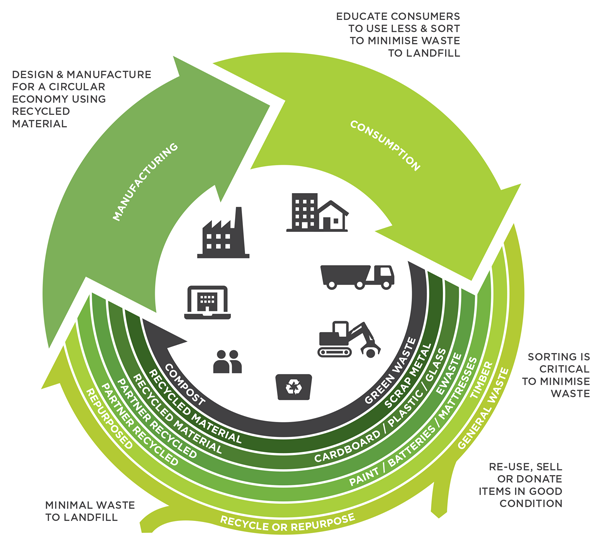RECYCLING GUIDE

WASTE FOR RECYCLING
Everyone needs to play their part for a circular economy to function.
- Designers and manufacturers have a responsibility to reduce waste and to use recycled material wherever possible in new products
- Consumers need to make choices that support the circular economy, endeavour to use less and to sort whatever waste they create to maximise recycling
- Transfer Stations, Councils and recyclers need to work together to educate and assist the public to ensure waste is properly sorted and the maximum amount is sent for recycling
- Minimal waste should be sent to landfill
Below is an outline of recyclable items and how they are recycled, as well as items that are not fit for recycling. Please contact our friendly team if you are unsure if we can accept your waste.
RECYCLABLE WASTE TYPE | EXAMPLE & ACCEPTED FORMAT | RECYCLING OR DISPOSAL |
GREEN WASTE |
|
|
METALS |
|
|
ALUMINIUM CANS |
|
|
GLASS BOTTLES |
|
|
PAPER & CARDBOARD |
|
|
E WASTE |
|
|
HARD PLASTICS |
|
|
SOFT PLASTIC |
|
|
PAINT |
|
|
NON-RECYCLABLE WASTE TYPE | EXAMPLE & ACCEPTED FORMAT | DISPOSAL INFORMATION |
GENERAL WASTE | General waste, also called residual waste, is material from businesses and households that cannot be recycled All waste is sorted at each Transfer Station to remove as much recyclable material as possible | Material that cannot be recycled is sent to landfill |
PROHIBITED ITEMS | Some waste cannot be disposed of at our transfer stations. For disposal of prohibited waste, please contact the following agencies NB: Commercial & builder’s waste is not accepted | Asbestos containing material contact EPA 1300 372 842 Household chemicals contact Sustainability Victoria 1300 363 744 Farm chemicals contact ChemClear 1800 008 182 Dead animals, sheep skins, offal or seafood waste and bulk vegetable waste contact EPA on 1300 372 842 Contaminated soils contact Gippsland Water 1800 050 500 |